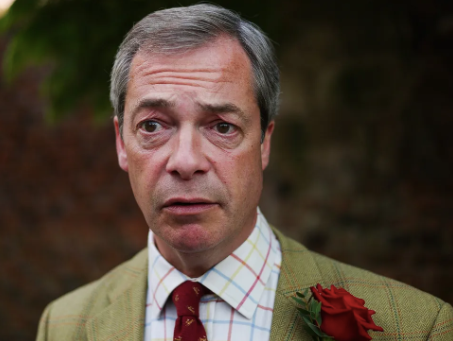‘Sorry Nige, you’re not coming in:’ A private bank has the right to leave Farage off its guestlist
Coutts has a right to protect itself from the reputational risk that comes with association with Nigel Farage, writes Tom Peck


A private bank is no different, really, to a private members club, and Nigel Farage is very upset indeed that his no longer wants him as a member.
He’s sent The Daily Telegraph a 40-page document his now former bank, Coutts, had compiled on him. It talks of him being “xenophobic and racist”, and that his “publicly stated views [are] at odds with our position as an inclusive organisation”.
Naturally, it being Nigel Farage, the world is very quickly up in arms. Coutts have been attacked by the home secretary, the business secretary and the prime minister. Nigel Farage thinks his having to bank with NatWest, like the horrid little people whose side he pretends to be on, is somehow an assault on his “free speech” and the government hasn’t wasted a second in agreeing with him.
This is always the way. In the European parliamentary elections of 2019, tipping a milkshake over Nigel Farage was an act of “political violence”.
Conversely, tweeting about whether or not you would rape the MP Jess Phillips – as Ukip candidate and fellow milkshake victim Carl Benjamin did several times – was again, simply “free speech”, or indeed “satire”.
No one really seems to have noticed or indeed cared, but the bank has issued a statement themselves which, as is the way, finds itself as the final paragraph in the roughly 10,000 articles on the subject. It begins with the words: “Our ability to respond is restricted by our obligations of client confidentiality.”
It is possible then – just slightly possible – that the greatest bulls*** merchant of the age is at it again. But even if we take his claims at face value, it would make it no less tedious to have to work through all of the old “free speech” arguments again.
Coutts is a commercial organisation. It hardly needs to be stated that it has a right – indeed, a commercial obligation – to protect itself from the reputational risk that comes with association with Nigel Farage.
“They had no problem with me as a client in 2014, 2015 and 2016, when arguably I was very controversial,” he said. “But I think the centre of gravity in both the public and corporate world has shifted so far to the left in the last few years that this is where we find ourselves.”
It’s possible he’s right about this, but only because what he’s said is meaningless. The world has been “shifting to the left” for a very long time. A hundred years ago women couldn’t vote. Fifty-five years ago homosexuality was illegal. It’s what the world does. It’s called progress. And there have always been, and always will be, people like Nigel Farage on the wrong side of it, getting very angry. These people are always in the wrong, and in the end, they always get put in their place, whatever small victories they claim in the form of temporary setbacks along the way.
Equally unsurprising is the urge to turn the situation on its head in the entirely wrongful belief that that will provide some kind of illumination. Why is it OK, people genuinely have asked, for Coutts to say no to Nigel Farage, but not OK for a baker to refuse to bake a pro-gay cake?
To which the obvious answer is that the two are not the same. The politics of discrimination and the politics of anti-discrimination are not comparable. One makes enemies, the other makes friends.
The only question that remains difficult to answer is whether this is what Coutts wanted. They wanted not to be associated with Nigel Farage and they certainly aren’t now. No one could possibly be more disassociated from him.
Their disassociation with him is all over the front pages of Nigel Farage’s favourite newspapers. And what about poor NatWest? If Nigel’s too racist for Coutts, isn’t he too racist for their boringly unillustrious banking division too?
NatWest is still 40 per cent taxpayer owned too. If a private bank gets to decide who is and isn’t too racist to bank with it, then why doesn’t the taxpayer?
Who would have thought, back in 2007, that the public bailout of RBS would end with the taxpayer being strong-armed into providing last resort banking services to people too controversial to bank with the big boys?
But also, frankly, who cares? Free speech, people do tend to forget, does not mean freedom from the consequences of what you say. Your sacred right to free speech actually involves very little more than not being imprisoned or criminally sanctioned for your opinions.
Nigel Farage can say whatever he likes. He always has done, and he always will. But if your presence, in a private bank or anywhere else, is deemed to be stinking the place out, you really can be asked to leave.






Join our commenting forum
Join thought-provoking conversations, follow other Independent readers and see their replies
Comments